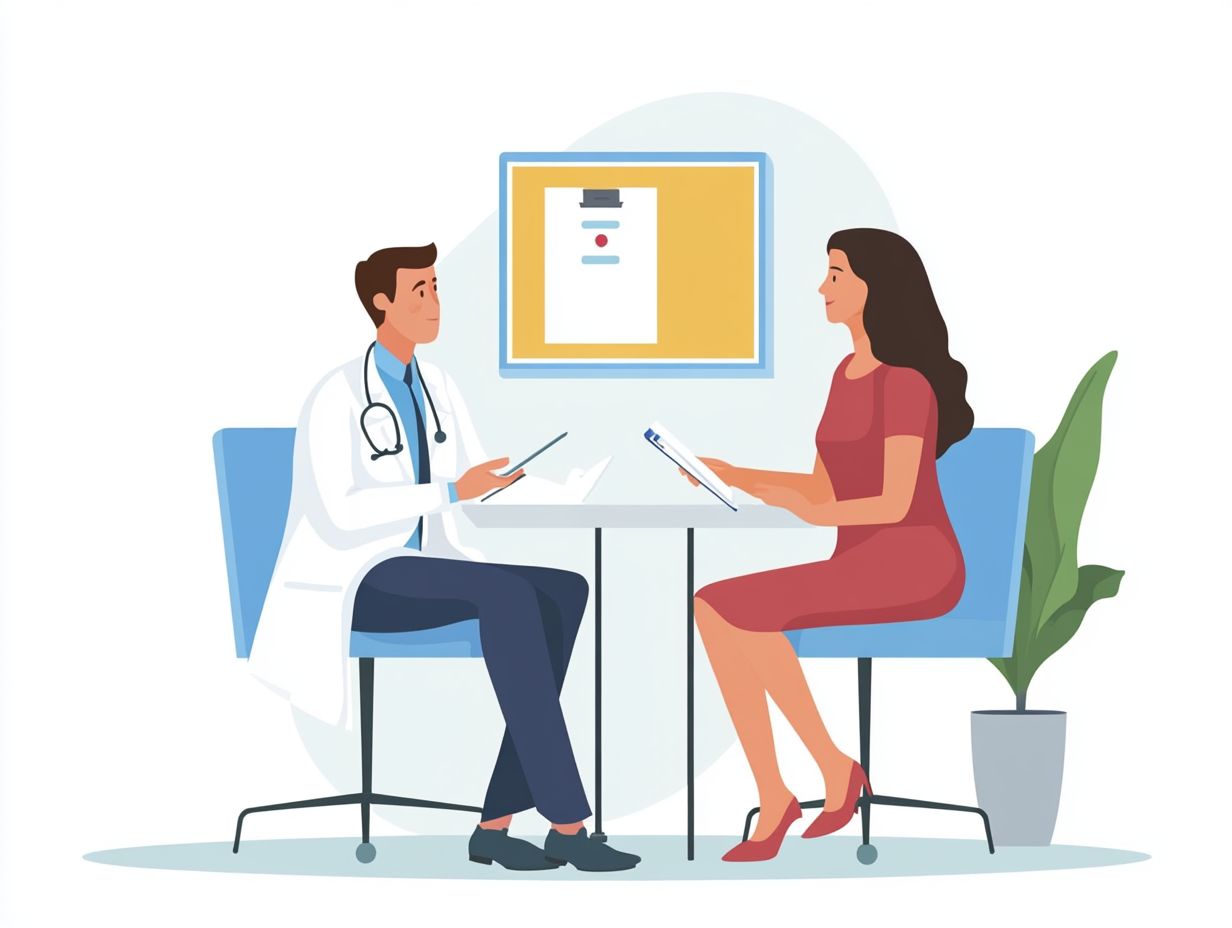Receiving a medical diagnosis can be an overwhelming experience, but asking the right questions can help you navigate your condition and care plan more effectively. This guide outlines ten crucial questions to discuss with your healthcare provider upon receiving a diagnosis, fostering a deeper understanding of your health status, treatment options, and future management strategies, including potential health risks.
- Understanding Your Diagnosis: Begin by clarifying what your specific diagnosis is and the symptoms associated with it. Discuss any medical tests required for a comprehensive diagnosis. This foundation helps in comprehending the nature of your condition.
- Prevalence and Causes: Inquire about how common your diagnosis is and its potential causes, including genetic and environmental factors, to better grasp its context.
- Treatment Options and Side Effects: Explore available treatments, including medication, surgery, and any alternative procedures, and their potential side effects. This information is vital for making informed decisions and preparing for any impacts on daily life.
- Impact on Lifestyle: Discuss how the diagnosis might alter your daily activities, potential changes required in your routine for safety and health, and the support resources available, such as support groups and educational materials.
- Prognosis and Monitoring: Understand the long-term prognosis and how often you need to be monitored, ensuring proactive management of your condition.
- Alternative Treatments: Ask about alternative treatment options that may complement traditional therapies, providing holistic approaches to health management.
These questions empower you to advocate for your health, ensuring your treatment plan, which may involve surgical procedures, aligns with your needs and preferences, ultimately enhancing your quality of life.
Key Takeaways:
1. What Exactly Is My Diagnosis?

A diagnosis is the identification of a disease or condition based on medical evaluation including symptoms, family history, and test results.
A doctor provides a diagnosis by analyzing these factors to determine the specific health issue affecting the patient.
2. What Are the Symptoms of This Condition?
The symptoms of [insert specific condition] include fatigue, pain, unusual changes in bodily functions, and potential risks of progressing to more severe conditions if untreated.
Symptoms vary based on factors like age, gender, and overall health.
Communicating symptoms to healthcare professionals aids in accurate diagnosis and treatment.
3. How Common Is This Diagnosis?
The commonality of a diagnosis refers to how frequently a particular condition occurs within a population.
For example, cancer is common, with one in two men and one in three women likely to receive a diagnosis in their lifetime. Discussing prognosis and treatment options with your doctor can provide clarity and guidance.
Other common diagnoses include diabetes and heart disease, which also have high prevalence rates.
The frequency of common diagnoses influences healthcare resources, with more prevalent conditions often receiving greater attention and funding.
4. What Are the Causes of This Condition?
The causes of a medical condition can include genetic factors, such as family history, lifestyle choices, and environmental influences.
Genetic factors involve family history and hereditary patterns that increase risk.
Lifestyle choices such as diet, physical activity, and smoking habits impact condition severity.
Environmental influences include exposure to pollutants and occupational hazards that contribute to health issues.
5. What Are the Treatment Options Available?

Treatment options for managing medical conditions include medication, surgery, physical therapy, and lifestyle modifications.
Medications target symptoms like pain or inflammation.
Surgery corrects anatomical problems.
Physical therapy aids recovery and mobility.
Lifestyle modifications improve overall health.
Healthcare providers create personalized treatment plans based on medical history, patient preferences, and the type of healthcare team involved.
6. What Are the Potential Side Effects of Treatment?
Potential side effects of treatment can include nausea, fatigue, dizziness, allergic reactions, changes in appetite, and potential infection risks post-surgical procedures.
Treatment side effects vary by method, such as medication, surgery, or alternative therapies.
Patients should discuss potential side effects with healthcare providers to manage and monitor their impact.
7. How Will This Diagnosis Affect My Daily Life?
A diagnosis affects daily life by requiring changes in routine activities, work schedules, and social interactions, depending on symptoms and treatments.
Adjustments may include managing fatigue, using physical therapy, and attending counseling for emotional support.
Support from family, friends, or groups aids in adapting and coping with daily challenges, ensuring that the treatment aligns with the doctor’s qualifications and expertise.
8. Are There Any Support Groups or Resources Available?
Yes, there are support groups and resources available for patients.
Support groups, including online forums and local meetups, offer community and shared experiences.
Educational materials and counseling services provide additional information and mental health support.
Accessing these resources can help patients manage their diagnosis and improve their well-being, taking into account any safety tips provided by healthcare professionals.
9. What Are the Long-Term Prognoses for This Condition?

Long-term prognoses for a condition predict the likely progression and outcomes over time based on disease type, patient health, and treatment response.
Prognoses vary widely; for example, cancer prognoses depend on stage at diagnosis and treatment effectiveness.
Regular monitoring and timely assessments are crucial for adjusting treatment plans and improving outcomes.
10. Are There Any Alternative Treatment Options?
Yes, there are alternative treatment options for managing health conditions.
Alternative treatments include:
- herbal remedies
- acupuncture
- yoga
- nutritional therapies
These options can offer benefits such as improved wellbeing and reduced side effects.
Consulting with healthcare providers is essential to ensure these therapies complement conventional treatments and avoid potential risks, including those related to anesthesia during surgical procedures.
How Can I Best Manage My Symptoms?
To best manage symptoms, adhere to prescribed medications, maintain regular communication with healthcare providers, and incorporate lifestyle adjustments like exercise, diet, and sufficient sleep.
Effective symptom management relies on a comprehensive treatment plan, timely follow-up visits with healthcare professionals, and understanding the doctor’s qualifications to provide the best care possible.
What Are the Risk Factors for This Condition?
Risk factors for a condition include genetic predispositions, lifestyle choices, and environmental factors.
Genetic predispositions involve a family history of related health issues.
Lifestyle choices impacting risk factors include:
- Diet
- Physical activity
- Smoking
Environmental factors, such as exposure to toxins or stress, also influence risk.
How Often Should I Be Monitored for This Condition?

The frequency of monitoring for a medical condition depends on the specific condition and should be determined by a healthcare provider.
Some conditions may require monthly check-ups, while others might only need quarterly assessments.
Follow your healthcare provider’s recommendations for monitoring frequency, considering factors like disease progression and treatment adjustments.
What Are the Warning Signs of a Flare-Up?
The warning signs of a flare-up include increased pain, fatigue, and swelling.
Recognizing these signs allows for timely intervention and effective management of the condition.
How Can I Advocate for Myself in My Treatment?
Advocating for yourself in treatment involves actively participating in healthcare decisions by asking questions, understanding treatment options, and communicating openly with your healthcare team.
Prepare questions in advance, learn about treatment options, evaluate the doctor’s qualifications, and maintain communication with healthcare providers to ensure treatment aligns with your needs and preferences, especially when considering surgical procedures.
What Are the Next Steps in My Treatment Plan?
The next steps in your treatment plan include scheduling follow-up appointments, completing additional tests, discussing medication effectiveness with your doctor, and evaluating any potential surgical procedures that may be necessary.
Adjustments to medication may be necessary if current treatments are not effective.
Setting clear, achievable goals with your healthcare provider is crucial for tracking progress.
Frequently Asked Questions
What are some important questions to ask at my diagnosis?
1. What is the exact name and type of my diagnosis?
2. What caused my diagnosis and what are the risk factors?
3. What are the symptoms and how will they affect my daily life?
4. Are there any treatment options available for my diagnosis?
5. How will my diagnosis be monitored and managed over time?
6. Are there any lifestyle changes I need to make to improve my condition?
7. What are the potential complications of my diagnosis if left untreated?
8. Are there any support groups or resources available for individuals with my diagnosis?
9. What can I do to prevent future flare-ups or worsening of my condition?
10. What is the outlook for my diagnosis and what should I expect in the future?








